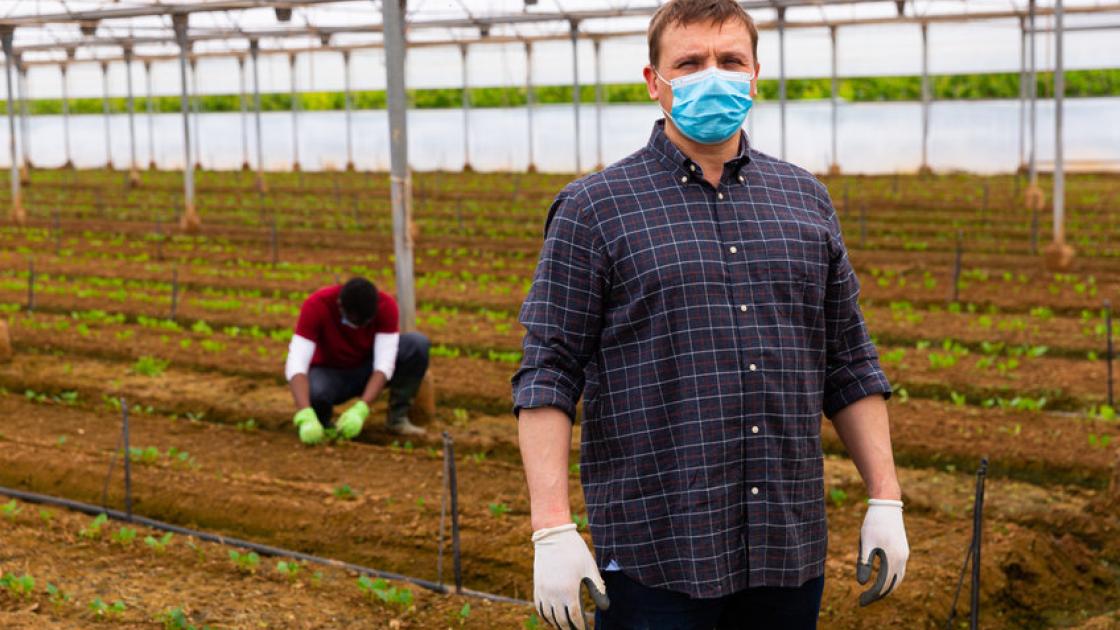
Respiratory hazards on the farm
Respiratory problems are some of the most common forms of occupational health hazards in the farming and agricultural industry. SIU Medicine urges local farmers and their families to be aware of common respiratory hazards and follow best practices for reducing their risk of short- and long-term respiratory problems.
Breathing hazards for farmers
Daily farming operations expose farmers to a wide range of situations that may be hazardous to their respiratory health. This includes any task that involves the use of or leads to the production or airborne release of:
- Chemicals, including pesticides and herbicides
- Gasoline and other types of fuel
- Manure and other forms of livestock exposure
- Contaminated water
- Smoke, toxic gases or fumes
- Dust, including wood and grain dust
- Mold spores, bacteria, fungi and other microorganisms
Farmers and their family members who smoke or have underlying medical conditions such as asthma, chronic obstructive pulmonary disease (COPD) and seasonal allergies may be even more sensitive to these farm-related breathing hazards.
Symptoms of respiratory trouble
When a farmer inhales potentially harmful gases or particulate matter, these compounds can irritate and damage parts of their respiratory system, including their nose, mouth, throat, trachea and lungs. In the short-term, this can lead to uncomfortable signs and symptoms like coughing, sneezing, shortness of breath, tightness in the chest and wheezing. People experiencing acute respiratory distress also often experience eye and skin irritation.
In certain cases (e.g., carbon monoxide exposure or acute pesticide poisoning), a person experiencing acute respiratory distress may develop severe or life-threatening symptoms, including lightheadedness, syncope (fainting) or seizures.
Due to the nature of their work, farmers are also at an increased risk of low level yet repeated exposure to particulate matter and gases, which over time can lead to a wide range of chronic respiratory problems.
Some specific respiratory conditions and syndromes associated with farming include:
- Asthma
- Bronchitis
- COPD
- Farmer’s lung or farmer’s hypersensitivity pneumonitis (FHP). Inhalation of mold spores, typically from moldy hay, grain or straw, triggers this allergic disease.
- Silo filler’s disease. Breathing nitrogen dioxide, a silo gas produced during silage fermentation, can impair lung function.
- Organic dust toxicity syndrome, aka grain fever, toxic alveolitis or pulmonary mycotoxicosis. Exposure often occurs in areas such as cotton processing areas, grain storage and poultry and hog barns, and can lead to lung damage.
Protection is key
Respiratory hazards are incredibly common on farms, but they are avoidable. You can protect yourself and your family in several ways.
- Identify your farm's unique respiratory hazards. Know the safety information of all chemicals used on the farm.
- Be aware of how these hazards may change depending on the time of year. For example, mold exposure risk increases in late winter and early spring.
- Wear properly fitted protective face masks or N95 respirators when necessary, as well as other personal protective equipment (PPE).
- Keep your workspaces and equipment clean and tidy.
- Work outside or in well-ventilated areas whenever possible.
- Use mechanical means (fans, exhaust blowers) to remove contaminants.
- Use strategies to reduce mold growth. For instance, harvest, bale and store hay and grain at the recommended moisture levels, and use mold inhibitors.
- Improve your overall health. Get regular exercise, watch your diet and don’t smoke.
- Know what to do if you or someone you know is accidentally exposed to a respiratory hazard.
Take steps to protect your health
Being a part of a farming community is a rewarding experience. Strive to make it a life-long career you can both endure and enjoy during a long life. And you don’t have to do it all yourself. If you could use a check-up or a check-in to support your own physical and mental well-being, reach out to the Farm Family Resource Initiative today by calling 618-713-0759.
Karen Leavitt Stallman
Ag Resource Specialist



